I’m in the Los Gatos Coffee Roaster, once again. Writing crazy BS. Thinking about Weena Wesson. Recall my mention of this character in my most recent post:
A scene in a UFO, with a bad kid, call him Denny Allaway, frantically humping a chunk of cow liver, imagining that it’s Weena Wesson, the Hollywood love goddess.
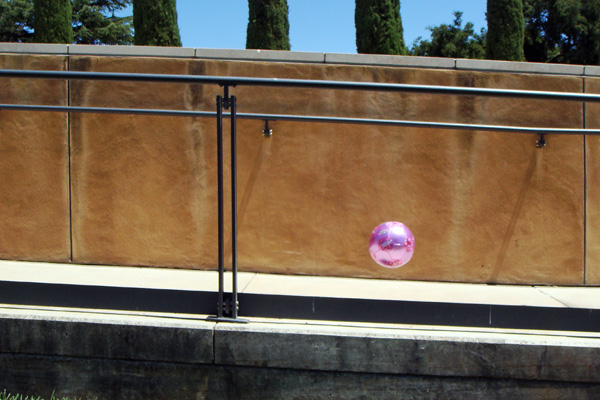
It makes me happy to think about a novel project. Actually calling a novel Weena Wesson might be overdoing it—I mean, the novel might not be about that at all. It’s just a phrase to start with.
Last night I had insomnia, and I was reading one of Allen Ginsberg’s biographies, Bill Morgan’s I Celebrate Myself: The Somewhat Private Life of Allen Ginsberg. I began imagining writing a transreal SF author autobio novel called, say, A Writer’s Life. That’s what Joyce’s great first novel is, come to think of it—dropping the SF element of course—Portrait of the Artist as a Young Man (1916).

[Photo of Pablo Picasso, Woman in an Armchair (Jacqueline Roque Picasso), 1960, at a show from the New Orleans Art Museum at the Cantor Art Center in Stanford. Note the two profiles, one light, one dark—it took me a few minutes to pick them out.]
Of course if I put SF in it, then that makes it unreadable for some largish percentage of the people in the world. Oh well!
Can I really put in the part about the cow liver and Weena Wesson? Maybe. The liver is hiding under the boy’s bed. She whispers to him through the mattress. Maybe her “real” name is an anagram. Awnee Swones. Anne Swesewo. Anne Wowesse.
Trolling the Web for irrelevant info, I found the YouTube video shown above, entitled “Weena + Me=Love,” showing two young women goofing around, filmed, I think, on the street by a stranger using a cell phone.
“Oh, mama!” says the woman on the right.
The good news is that people think they saw me making love to the legendary Weena Wesson—the bad news is that my co-star was in fact a cunningly tweaked cow liver.

In any case, I’m thinking it more interesting to cast any memoir-like work into a novelistic format—like I’ve done in the past. Really, all of my novels are transreal—in the sense of having a character who in some sense represents me during some part of my life. I first worked out a correspondence between my life and my novels in some detail in an interview for Hayakawa SF Magazine around 1998 (see page two of my online interviews.)
Just today I realized that I can force all eighteen of my novels into the table.
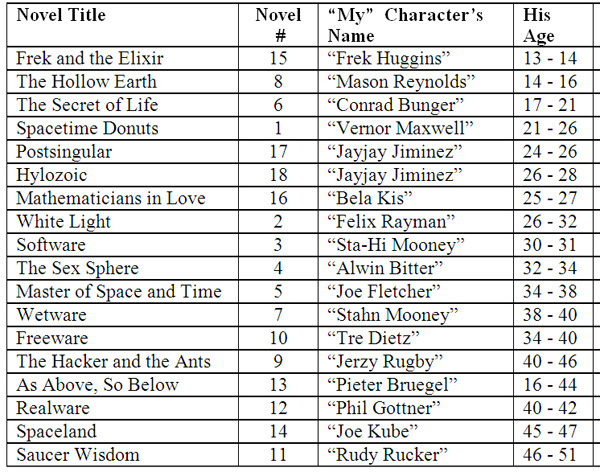
I see there’s room at the start and the end. Boyhood and dotage. Maybe an old man is recalling his early years. (Speaking of dotage, I think the ages are off for some of the novels, especially Spaceland and Realware. So write a paper about it…)
Okay, fine, so what’s the title if not Weena and Me?
Kentucky. Fallout. Yellow Dust. Maybe A Writer’s Life? That’s right on the transreal border between fact and fiction—which is, nah, too confusing, or even off-putting. And it’s been used a lot.
I’m looking for a title that suggests the quality of what it’s like to become a writer and/or a scientist. The Branecaster is good, but I used up that word in Frek and the Elixir. Daydreamer is nice, but, oh oh, Ian McEwan used that for a kids’ book title in 2000. Dreamlight? No, been used a lot.
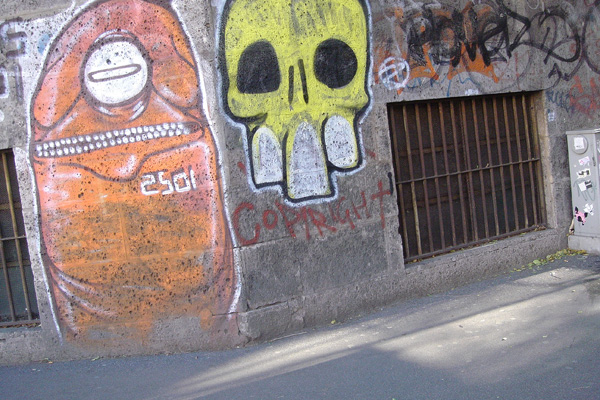
Often it’s better to get deeper into my own particular jargon, so as to find title possibilities that aren’t so picked over. I’m thinking of my beloved Belusouv-Zhabotinsky scroll patterns. Turing Patterns. Standing Waves. Nested Scrolls.
I like that last one. Nested Scrolls. Searching Amazon for that phrase, I find it’s not a title, but it does appear in—two of my books: Mad Professor and the Lifebox tome, apparently the same passage in both books, tsk tsk.
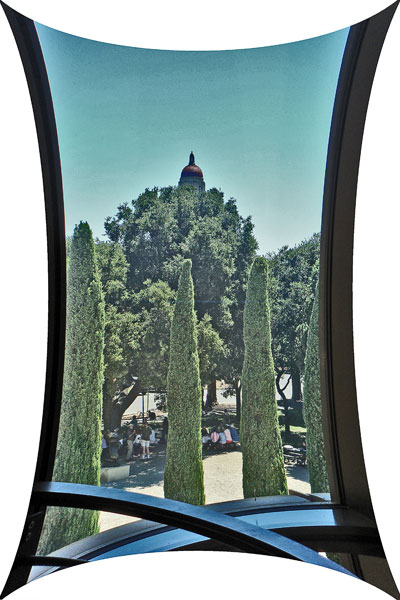
I’m writing almost at random in these notes. Which could be a good thing. I’ve heard it said that writers are at their best when they have no idea what they’re doing.
In the last chapter of Nested Scrolls, the (now-dead) hero Tim’s acquaintance (not really a friend) Denny Allaway is thinking about Tim, and Denny realizes that it doesn’t really matter that Tim is dead, any more than it matters when a pinecone falls off a tree, and that if Tim hadn’t saved the world, someone else would have, maybe even Denny himself, if he hadn’t of been so busy humping that 120 pound chunk of cow liver made up to look like Weena Wesson. The cow liver is sitting next to him, sharing a bottle of hard lemonade.
“Muuur.”
“I love you, Weena.”
That’s so commercial…
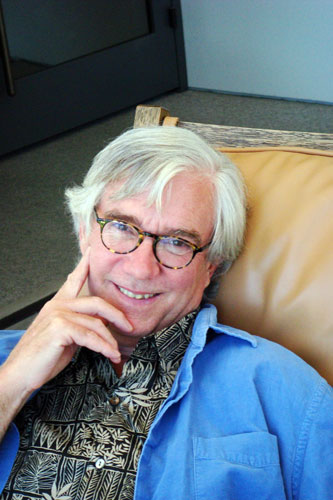
A Louisville memory. Waiting by the side of Route 42 near Rudy Lane for Barbara T. to pick me up and give me a ride to nursery school in her 1951 Buick Roadmaster with the four little portholes set into the side of the hood. Miss T. wore more lipstick than any woman I’ve ever seen, it was almost like she put it on by eating it. Tidy, well-dressed, but not terribly attractive, she lived with her mother. I liked her, up to a point, as I found her pretty easy to talk to, although not so easy as my own parents. She later gave me a science-fiction/fantasy book that I liked a lot—or maybe I just found it in her house while my parents were having a dinner with her— the book was called Zotz!, by Walter Karig, 1947.
I should mention that, initially, it seemed reasonable and natural to me that the street I lived on would be called Rudy Lane, only later did I realize that it was a coincidence, due to the fact that at some point a family with the last name of Rudy had lived on the road, which was maybe three miles long.
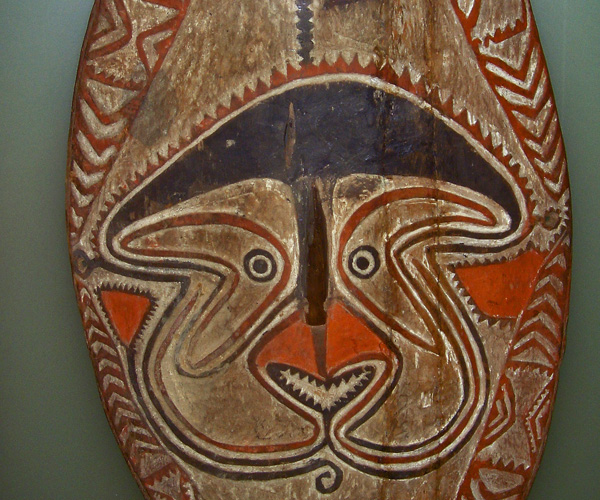
I remember some of my first days at nursery school, or maybe at kindergarten—the two blend together, and it’s hard to be sure which memories come first. I remember a large room called Hilliard Hall, with grayish-black asphalt tiles on the floor, and ordinary sash windows in the walls. We had some really big blocks to play with, maybe two or three feet on a side. You could stack them and make little mazes. They made a hollow boom when they fell down.
We’d play a game where we’d dance around the room with a record playing, and now and then the teacher would lift up the needle and you’d have to freeze in place where you’d been right when the music stopped, and if you didn’t freeze fast enough, you were Out.
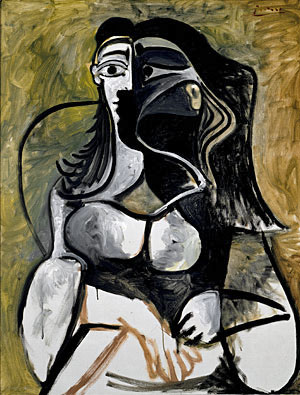









July 30th, 2008 at 10:33 am
consciousness is of course contingent on the ability to lie. whether in year million or now. the greeks afterall, if i remember right, thought humans invented speech as a cloaking for telepathy..
bests
July 30th, 2008 at 3:17 pm
HEY rudy what has greek goota do with the Grand Wazoo any soon me go Hamburg BACH meetz Zappa be4 ARF – why nut cum ====
G
August 1st, 2008 at 9:29 am
Rudy, the game is Freeze Tag. Auf Deutsch, frieze day. Might be a good story title too.